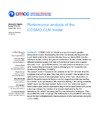COSMO-CLM (or CCLM) is a non-hydrostatic parallel atmospheric model, developed by the CLM-Community starting from the Local Model (LM) of the German Weather Service. Since 2005, it is the reference model used by the german researchers for the climate studies on different temporal scales (from few to hundreds of years) with a spatial resolution from 1 up to 50 kilometers. It is also used and developed from other meteorological research centres belonging to the Consortium for Small-scale Modelling (COSMO).
The present work is focused on the analysis of the CCLM model from the computational point of view. The main aim is to verify if the model can be optimised by means of an appropriate tuning of the input parameters, to identify the performance bottlenecks and to suggest possible approaches for a further code optimisation. We started analysing if the strong scalability (which measures the improvement factor due to the parallelism given a fixed domain size) can be improved acting on some parameters such as the subdomain shape, the number of processes dedicated to the I/O operations, the output frequency and the communication strategies. Then we profiled the code to highlight the bottlenecks to the scalability and finally we performed a detailed performance analysis of the main kernels using the roofline model.


